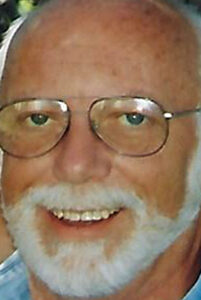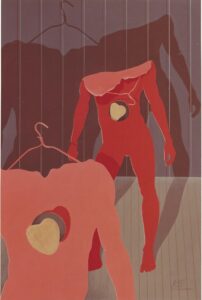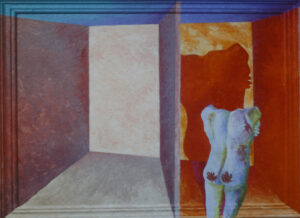In the spring, a young man’s fancy lightly turns to thoughts of…blowholes. “Humpback sex photographed for first time–and both whales were male,” The Guardian newspaper reported in February.
Despite decades of research on humpback whales, sightings of the male’s penis have been rare. Copulation by the species had not been documented by people – until now, when two photographers captured images of a sexual encounter between two whales off the coast of Hawaii.
The sighting, confirmed by scientists in a newly published study, occurred in January 2022 in waters west of the island of Maui, where two whales approached and circled a boat before engaging in sexual activity about three to five meters below the vessel.
Both of the whales were male, which makes the photos, taken by Lyle Krannichfeld and Brandi Romano, the first evidence of homosexual behavior in humpback whales as well as the first sighting of sex in the species.
In other queer animal news, a green honeycreeper was sighted in Colombia with a rare mutation called bilateral gynandromorphism. In plain English, that means that one half of the bird’s plumage is electric blue like a male, the other half emerald green like a female. The New York Times appreciates how fashion-forward our community is: “This Bird Is Half Male, Half Female, and Completely Stunning”. See pictures at the link.
It is not entirely clear how the condition comes about, but one leading theory is that it results from an error during the production of egg cells in female birds. Female birds have two different sex chromosomes, designated W and Z, while males have two Z chromosomes. An error during egg cell production could result in two fused or incompletely separated cells, one with a W chromosome and one with a Z chromosome.
If those fused cells are fertilized by two different sperm, each of which carries a Z chromosome, the result might be a bird with the WZ chromosomes of a female in some cells and the ZZ chromosomes of a male in others. “And so you get a bird that’s half and half,” Dr. Spencer said.
These stories remind me of a recent episode of the podcast Straight White American Jesus, where hosts Bradley Onishi and Dan Miller offered a decisive takedown of conservative Catholic “natural law” theory–the theology that (allegedly) deduces the purpose of human sexuality from observations of biology. Surprise surprise, that purpose is heterosexual procreation, only. But why is it, the podcasters asked, that such Christians’ ideas of biology are stuck in the era of Aristotle, or at the latest, Thomas Aquinas? No amount of evidence of homosexuality in the animal kingdom, let alone modern human psychology, can make a dent in their cis-hetero-patriarchal idea of “Nature”.
Let’s just keep on with the gay links a little longer. I resonated with Jarek Steele’s personal essay “The Club” at Electric Literature, subtitled “In a bathhouse meant for cis gay men, trans is transgressive”. Steele and his trans male friend decide to integrate their local bathhouse in St. Louis, a space that traditionally “wasn’t meant for my eyes, the eyes of a man who was assigned female at birth.” For the author, it wasn’t about looking for a hookup, so much as feeling present in his body, being accepted as a gay man in a place that’s been central to their culture. “What I wanted was uncomplicated. I didn’t need acrobatic sex or a million orgasms. I just wanted to be in the room.” He describes a flirtation there that didn’t end in sex but was healing nonetheless.
Before I stopped using women’s restrooms, I was used to people talking and holding the door for each other. It took practice to master the art of men’s rooms. Walk in. Stall. Hurry. Sink. Hurry. Walk out. No looking or talking, especially at Lowe’s or even the YMCA. Maybe I was just like that because I was afraid to stop moving. Maybe they were too busy trying not to be seen to notice me anyway.
But here was a place built for anonymous sex, where looking and touching was the point. It was a temporary ceasefire with rules for those desperate to be touched without consequence, and even though Steven and I hadn’t come here to hook up, I felt a crushing tenderness toward these awkward, average, strikingly beautiful middle-aged men who came to an anonymous place to stop diverting attention, to stop feeling poisonous. Just like me.
…As I followed Steven silently back through the shadowy maze toward the locker room, a stranger emerged from around a corner. We passed each other there in the dark hallway in that bathhouse in a manufacturing district in St. Louis, late morning on a Tuesday in February. This anonymous man’s friend, if he was a friend, had turned away. I slowed to let him pass. He reached up and stroked the hair on my chest, a passing glance before we walked away from each other. I wanted to take his hand. I wanted to touch his face. I wanted to be gentle. I wanted not to be gentle. Every second of my life lived in that tender stroke of my chest in the dim light of the most nakedly male place in the world, where I had trespassed and had been wanted.
Meanwhile, Anastassia Gliadkovskaya, at the website Fierce Healthcare, reports on a potentially deadly form of exclusion: “Denied care: Trans men struggle for inclusive gynecologic healthcare”. She interviewed a patient who was turned away from several OB/GYN offices in New York City because he identified as male, which meant that his ovarian cancer was not diagnosed until he had gender-affirming surgery. Although such discrimination is technically prohibited, many medical programs still give insufficient training in gender-inclusive care, causing doctors to feel ill-equipped for such cases.
Noah Communoah’s blog Communotes, which I discovered via Daniel Lavery’s Substack, posted an article about his deconversion from Christianity that struck a chord with me. “On the Christian Question” talks about Noah’s journey into, and out of, an attraction to a hardcore faith that promised justice for his trauma.
My best friend at Simon’s Rock was Wren (pseudonymized as usual), a transmasc MCR fan and fellow fledgling anarchist. We were both survivors, and vocally so: we were not doing well. Wren was Catholic, raised in a secular family but committed to a feminist veneration of Mary— and to the transcendence of soul over body. (I’ve since learned that the latter is a gnostic heresy). At the time, neither of our bodies were a particularly hospitable place to be. We were both coping with dysphoria and rape trauma, and had turned towards Tumblr communities that were proudly sex-negative. So I experimented with the religion of Simone Weil and Catherine of Siena, of which Wren had long been a disciple. And I tried out Christianity too…
…I had serious misgivings about the basic Lutheran doctrine of solo fide, justification by faith alone. I thought that non-Christians should get to go to heaven, of course. But more than that, I thought that evil Christians should be damned to hell.
My dad is a miserable, controlling man, prone to outbursts of rage and deeply averse to any kind of therapy. He has two coping skills— exercise and prayer—and relates to both of them in excess. One of my last memories of him, right after he beat up my sister, involves him praying for forgiveness and then going for a run. He didn’t bother apologizing to us.
I found it hard to believe in a god that could forgive him. I fantasized about hellfire for him and the other men who’d hurt me, recited Psalms for the destruction of my enemies. At the same time, on this mortal coil, I had recently embraced abolitionist politics. It made intuitive sense to me; the court system facilitated my dad’s abuse, and the cops abused my girlfriend for trying to escape her own violent home. But just because I knew policing hurt survivors doesn’t mean I was ready to give up on punishment. Hell was an eternal prison sentence, but one administered by a perfectly fair and wise judge. I secretly believed in a kind of purgatory, where thoroughly rehabilitated offenders could someday access heaven. But I knew my dad never would…
…My theology changed when my politics did, which changed with my relationship to trauma. I saw the survivor advocates I trusted, who encouraged me to see my abusers as monstrous, get outed as interpersonally violent themselves. I saw autistic and mad trans women accused of spurious abuses, then “held accountable” by removing every resource they had to survive. I read Against Innocence by Jackie Wang; I did EMDR. I just didn’t want to torture my abusers anymore.
So Christianity became something new. By this point, I had lived on my own for about four years, then returned to my mom’s house for disability care. I joined a local ELCA congregation that advertised as progressive and affirming. I made friends with the pastor, an incredibly sweet woman who I still think of fondly. And I started reading about queer theology: Jesus as dissolving the human/deity binary, the God character as a BDSM top, Paul as a sex-repulsed asexual. I loved the possibilities of textual interpretation, but I was still terrified of getting it wrong. After all, the Bible had to mean something specific, right? Otherwise what’s the point?
I quit Christianity without much fanfare. I just started HRT, moved to New York, and for the first time really felt comfortable in my skin. It just didn’t make much sense to go to church anymore. There was nothing I needed there.
I look forward to a future post where Noah explains his conversion to Judaism!
I admit it, I’m one of those bad people who can never remember the difference between Naomi Wolf (second-wave feminist author of The Beauty Myth turned alt-right conspiracy theorist) and Naomi Klein, the Canadian filmmaker and progressive political analyst who had to write a whole-ass book about repeatedly being mistaken for Naomi Wolf! In response to Israel’s bombing of Gaza, Klein has generously shared two chapters from Doppelganger on her website about “trauma-forged identity politics”. These chapters discuss “how the Nazis were influenced by European colonial and racial segregation in the Americas—and how a failure to reckon with those connections shaped and misshaped Israeli history, and contributed to exiling Palestinians into an unbearable purgatory.” It seems to be human nature to mirror our enemies instead of reflecting on ourselves.


